バングラデシュでのコロナ禍での課題学習の取り組み
【2021年1月の活動報告】
1. Activity report for January 2021
In the GENKI program, we resumed the distribution of Euglena cookies during the period when Corona was closed * 1. In January, we distributed 171,000 cookies to about 6,000 people at 36 of the 66 schools covered by the GENKI program.
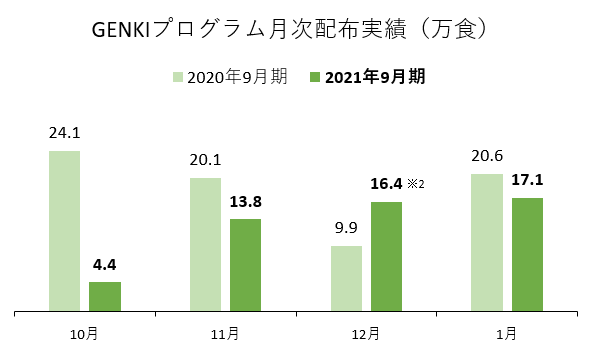
※1休校中でも先生方にはクッキー配布の為、学校に来ていただき、プログラムを再開する仕組みを確立しています。コロナ禍におけるGENKIプログラムの活動状況については、2020年8月、2020年10月の活動報告をご参照ください。
※2 例年12月は月の半分以上が冬休みで配布日数が少なくなりますが、2020年度は15日分を1度にまとめて計2回(合計30日分)配布しました。そのため、コロナ禍前の2020年9月期より配布数が多くなっています。
2. Efforts to learn tasks in Corona
As I reported in last month's report, some schools are partially open, such as having children attend school on a regular basis and imposing assignments in order to catch up with the delay in studying at Corona. There is also a place. This month, we would like to introduce the assignment learning efforts of Hamin Model Elementary School, which is one of the target schools of the GENKI program.
In Bangladesh, school closures began on March 17, 2020. Children became lonely about not being able to meet their friends, and at the same time became anxious about the lack of learning opportunities. Considering this situation, the school decided to provide a place for task learning while maintaining a social distance.
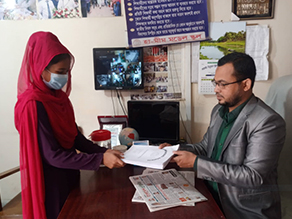
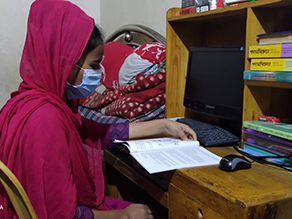
Assignment learning is a system in which children go to school once a week on the days of the week determined by the grade. Do the assignments given the previous week at home and submit them to the teacher when you go to school. The teacher will return the answers from the previous week to the children. Children can ask questions on the spot if they have any questions, but the question time is limited to a short time. The teacher finds it difficult to follow each child due to time restrictions. On the other hand, when studying at home, some children struggle to not immediately ask the teacher any questions.
To solve this problem as much as possible, the school has begun tutoring for those who wish. By paying about 400 yen a month to the school, they will visit your home and teach you the tasks. Most of the participants are fifth grade children who take the national unified promotion test, which is similar to the "university admission common test" scheduled in December every year.
The Bangladesh government has instructed the school to reopen in February 2021, but unfortunately it will be open only once a week for each grade * 1. Therefore, the school side wants to continue this task learning and tutoring efforts.
* 1 The Daily Star (2021). Closure of all educational institutions extended till February 28
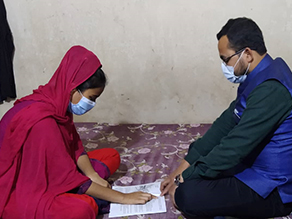
3. Bicycle situation in the capital Dhaka
Bangladesh's main modes of transportation are rickshaws (three-wheeled rickshaw-like vehicles), CNG (natural gas-powered auto three-wheeled vehicles), and cars. The roads in the capital city of Dhaka are always crowded and the horns are ringing.
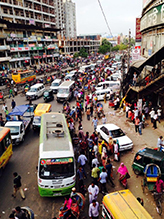
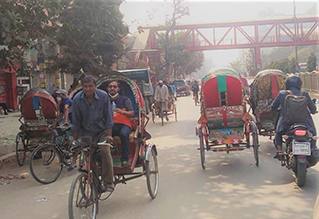
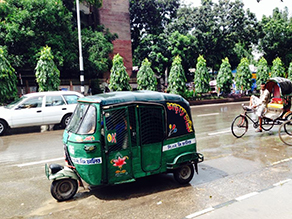
Meanwhile, the use of bicycles has increased rapidly in recent years.
In fact, even from a global perspective, Bangladesh is a major bicycle manufacturer and the third largest exporter of bicycles to Europe * 2. The market for imported and domestically manufactured bicycles is expanding in Japan as well. The income of citizens has improved, it can be used easily even on crowded roads, and it is good for health, so the number of bicycle lovers is increasing in ordinary households.
In addition, due to the influence of the Corona disaster, food delivery services and online shopping are increasing, and bicycles are also used for these delivery services. Food Panda, a bicycle for home delivery, has become common in the city, similar to the home delivery service that is often seen in Japan these days. As a convenient means of transportation, bicycles may become more and more popular in Dhaka city.
* 2 DATABD.C (2020) Bicycle Industry in Bangladesh: Pedalling into Glpbal Market
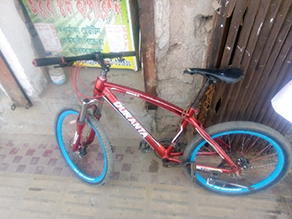
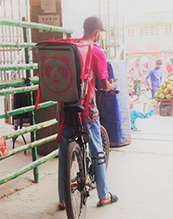
Shoshi, a fifth grader who attends the GENKI program target school, is also one who loves to ride a bicycle. Two years ago, Shoshi's father saved money and bought a used bicycle for about 5,000 yen. Considering that the average monthly household income in slums is about 20,000 yen, it is difficult to obtain. Shoshi was delighted to ride this precious bike in the neighborhood.
However, in the state of emergency caused by the corona wreck, the income of Shoshi-chan's family, who runs a tailor, dropped sharply. The monthly income of about 18,000 yen has decreased to about 5,000 yen. Unfortunately, Shoshi-chan's bicycle was sold for about 4,000 yen, and I had no choice but to add it to my family's life.
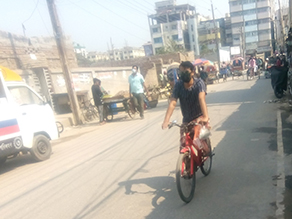
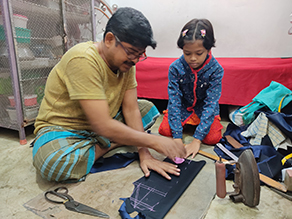
The monthly household income has now returned to around 13,000 yen. Shoshi is looking forward to riding a bicycle again and is helping to tailor her family.
We hope that the days when children attending GENKI program schools will enjoy studying and hobbies at school will not be long.
We look forward to your continued support.
Euglena Co., Ltd.
Overseas Business Development Department / Bangladesh Office

